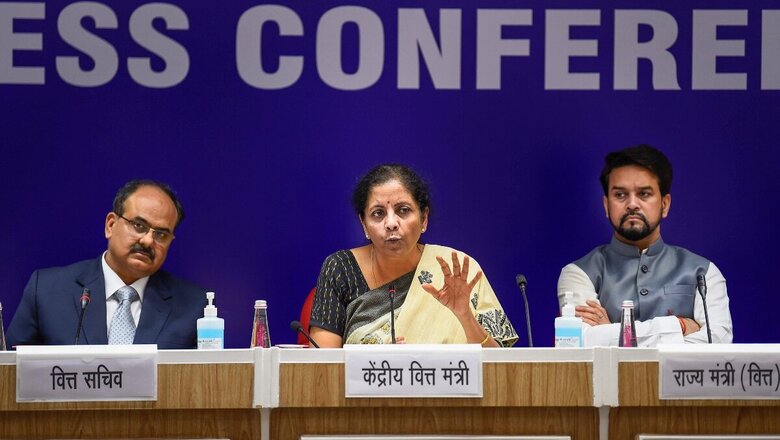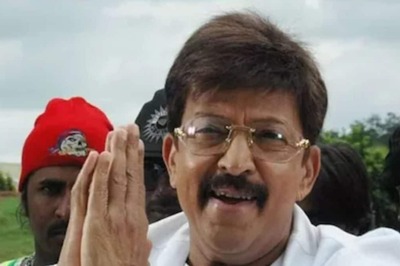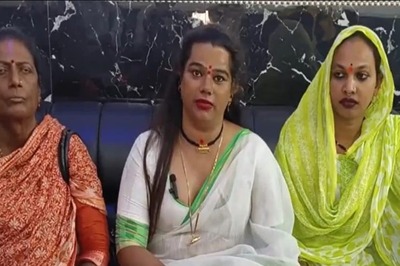
views
The GST compensation due with the Centre for four months are enough to pay salaries to all Punjab government employees for two months, said the state’s finance minister Manpreet Singh Badal. He was responding to Union Food Processing Minister Harsimrat Kaur Badal over her assertion that the Centre has cleared the entire pending GST compensation amount for the state by releasing Rs 12,187 crore for FY2019-20.
@HarsimratBadal_ What?GoI has cleared entire GST compensation?Sorry. The compensation has only been received upto March 2020.4 months of dues are still pending. April, May, June, and now July 2020. 1/3 https://t.co/TZGzBZUtaO— Manpreet Singh Badal (@MSBADAL) July 28, 2020
The Punjab finance minister said dues for four months were still pending, without perhaps realising that the Union minister was speaking of compensation due up to March 2020 whereas he was referring to dues after March.
This war of words on Twitter came just when several reports emerged about the Centre’s inability to continue paying GST compensation dues to states and the possibility of the GST Council examining ways to resolve this issue.
A meeting of the council was expected in July, but has not taken place. The nub of the issue is this: states depend rather heavily on the GST compensation amount in usual circumstances, but now, after the Covid-19 induced economic slowdown and consequent steep decline in states’ own revenue collections, the dependence on this Central fund transfer has increased.
So the possibility of having to forego some or all of this amount is understandably spooking state governments.
Madan Sabnavis, chief economist at CARE Ratings, said the only option out of the current stalemate is for the Centre to raise its borrowings and compensate the states in full. He pointed out that the states themselves are hamstrung with borrowing limits and it is incumbent upon the Centre to expand its fiscal deficit, borrow the needed amount and fulfil the compensation obligation.
When myriad central and state level taxes were amalgamated into a single tax, the GST, the Centre had promised the states compensation for any loss in revenue due to its implementation. The base year taken was 2016-17 and it was agreed that if any state reported revenue growth lower than 14% year-on-year for the next five years, it would be compensated with the differential amount by the Centre.
In 2017, a cess had additionally been imposed on certain items to compensate state governments for any revenue loss. In any case, the compensation payable to a state was to be provisionally calculated and released at the end of every two-month period. It was subsequently to be finally calculated for every financial year after the receipt of final revenue figures for five years.
Taking to Twitter, Kerala finance minister Thomas Issac said: “According to news reports the hearing before Standing Committee on Finance, Centre has taken the stand that GST Compensation can’t be paid and present arrangements be revised by Council. Such a brazen betrayal of federal trust! Convene the Council meeting immediately as promised.”
According to news reports the hearing before Standing Committee on Finance , Centre has taken the stand that GST Compensation can’t be paid and present arrangements be revised by Council. Such a brazen betrayal of federal trust! Convene the Council meeting immediately as promised— Thomas Isaac (@drthomasisaac) July 29, 2020
Finance Minister Nirmala Sitharaman is the chairman of the council.
But while states are right to demand due compensation as provided by the law, the Centre also has its hands tied. With economic activity severely impacted during the first quarter (April-June), the shortfall in overall GST collections has been a whopping 41% or 41 paise in every rupee compared to the same three-month period of 2019.
Where will the Centre find the money to compensate states when instead of growing, revenues were down significantly? According to a finance ministry statement, GST collections for April fell short by almost three fourths (down 72%) at Rs 32,294 crore; for May, they were down by nearly 40% at Rs 62,009 crore, while in June the shortfall was 8% at Rs 90,917 crore, compared to the same month in the previous year.
And earlier this week, the Centre had anyway released compensation of Rs 13,806 crore for March.
With this, the entire compensation due for 2019-20 has been released to states at Rs 1,65,302 crore. This was more than the cess collected during the year at Rs 95,444 crore. So the Centre had to dip into the balance of cess amount collected during 2017-18 and 2018-19 to fulfil its obligation.
So why should the Centre compensate states for loss in revenue while assuming that year-on-year revenue growth would be 14% for them?
Sachin Menon, partner at National Head of Indirect Taxes at KPMG said, “It was a compromise formula agreed upon by the Centre, to buy the consensus of all states for introduction of GST. The 14% year-on-year revenue growth envisaged in this formula for all states was not an easy target to begin with. The Centre may have calculated additional differential amount payable to states under normal circumstances before agreeing to it. But a Covid situation could not have been envisaged.”
If states do not get their due compensation, their economies will likely suffer a significant blow.
Vinayak Chatterjee, chairman of Feedback Infra Group, tweeted: “Centre conveying its inability to transfer requisite GST funds to States is worrisome. States account for 60% of overall sarkari spending .Whilst States will, without doubt, prioritise release of routine payments, cuts will be on infra & public works. Whither Demand Stimulus?”
???? Centre conveying its inability to transfer requisite GST funds to States is worrisome. States account for 60% of overall sarkari spending .Whilst States will, without doubt, prioritise release of routine payments, cuts will be on infra & public works. Whither Demand Stimulus ?— Vinayak Chatterjee (@Infra_VinayakCh) July 30, 2020
Can Centre and states agree to raise tax rates under GST, rejig slabs, increase the cess etc. to overcome the present imbroglio?
Bipin Sapra, partner at EY, said this would be a long-drawn process and could become counter-productive. “This will not be the most efficient solution and would also impact overall demand.”

















Comments
0 comment